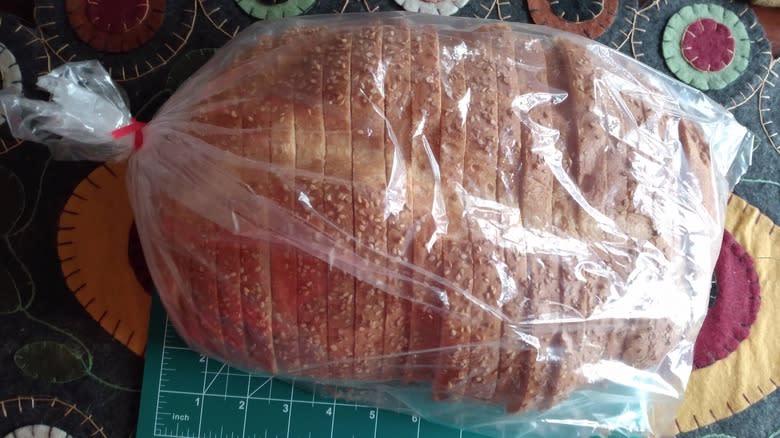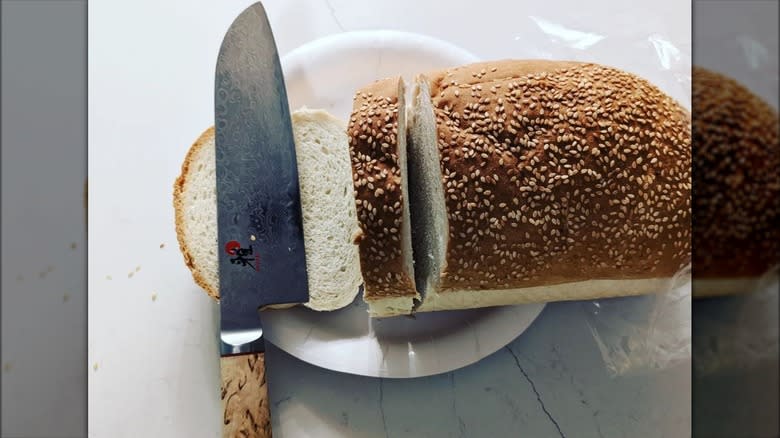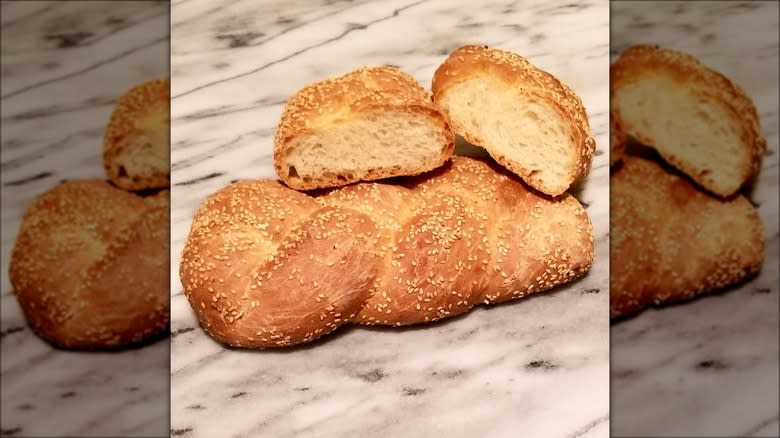Scali: Boston's Signature Take On Italian-Style Bread

Even those of us who have lived our entire lives in and around the city of Boston will be hard–pressed to believe our beloved Scali is not an authentic Italian bread. The creation of the ubiquitous sandwich bread we take for granted, Scali (pronounced "skah-lee") is widely credited to the Scali family. While details are sketchy — we haven't been able to make a direct connection to a past or current bakery or business — blogger John Regan, a longtime Boston-area resident who currently lives in Seattle, has fond memories of the Scali bread he grew up eating at The Chateau Restaurant in the Boston suburb of Waltham, Massachusetts. Regan also has some intriguing recollections of the clandestine nature of the daily bread delivery.
In a 2018 post, Regan described "the magnificent bread" that "came in fresh daily from a secret location in Boston's North End" while alluding to the well-kept secret of the bread's origins. Tongue-in-cheek? Maybe. But entertaining nonetheless. Regan swears he knows the details, but insists he took a lifelong oath of secrecy. Still, the information he shared in the blog post has the makings of a Ben Affleck Boston mob movie.
Here's the gist: According to Regan, on a daily basis, the restaurant's bread delivery guy drove a van bearing the name of a fake company to a location in Boston's North End, where he gained entry via a secret code. Once inside, he unloaded cash from a hockey bag, replaced it with fresh bread, and headed back to Waltham.
Read more: 25 Most Popular Snacks In America Ranked Worst To Best
What Is Scali Bread?

Even in light of his tale of clandestine transactions and secret codes, Regan acknowledges he's not entirely sure there ever was a Scali family connected to the Scali bread we know and love. Regan told Tasting Table that by the time he was introduced to Scali bread in the 1970s and 1980s, the name had become a generic reference to a particular style of bread. And it's style is what makes Scali stand apart from run-of-the-mill Italian bread. While we can't trace its origins to a specific family bakery, we do know Scali bread is a fluffy white braided loaf with a soft sesame seed-coated crust.
Aside from appearance, the differences between Italian bread and Scali bread are subtle. In addition to a slightly different flour-to-water ratio for the starter, Scali bread dough calls for nonfat dry milk and olive oil. It's also traditionally made using a preferment, the relatively simple process that gives Scali bread its unique texture and flavor. In its simplest form, a preferment (think of it as a starter), is a separate piece of dough prepared prior to the primary dough, and allowed to ferment for a few hours, or overnight, before it's incorporated into the rest of the dough.
A Taste Of Home

That extra step results in a more complex texture and a wheat-forward flavor. In another departure from a traditional loaf of Italian bread, Scali crust is coated with nutty sesame seeds prior to baking. In and around Boston, it's a weekend staple, perfect for sopping up the last bits of sauce or gravy at Sunday dinner. That's if it lasts long enough to grace the table. The scent of warm Scali bread, fresh from the oven or bakery, is difficult to resist. Topped with a slab of fresh butter, it's heaven on earth. While Scali bread is now widely available in grocery store bakeries, at least one local bakery claims it continues to make the regional favorite according to an authentic recipe.
The Winter Hill Bakery in Somerville, a quick hop across the Charles River from Boston, sells Scali for $2 a loaf. The bakery has become a mecca of sorts for Boston natives who have relocated to other parts of the country, places where no one's ever heard of Scali bread. When asked by friends to describe Scali bread, John Regan, the blogger who now lives in Seattle responds, "It tastes like home."
Read the original article on Tasting Table.

